|
|
|
Sort Order |
|
|
|
Items / Page
|
|
|
|
|
|
|
| Srl | Item |
| 1 |
ID:
080306
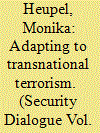

|
|
|
|
|
| Publication |
2007.
|
| Summary/Abstract |
During the 1990s, and particularly since 9/11, state-sponsored terrorism gradually declined, while transnational terrorism, which largely operates without direct state support and features cross-border network structures and a greater propensity to mass-casualty attacks, has gained in importance. Setting out from this observation, the purpose of this article is to examine whether the UN Security Council (SC) has adapted to transnational terrorism and, if so, how. Providing a systematic and theory-guided comparison of the SC's approach to these different types of terrorism, the article shows that, contrary to common considerations, the SC did adapt to transnational terrorism. The SC applied sanctions against terrorists and committed every state to instituting far-reaching generic counter-terrorism measures. Moreover, in an unprecedented way, it made use of managerial compliance strategies to foster implementation. In this way, the SC adapted to transnational terrorism by demanding more from states and intervening deeper into their domestic realm, while at the same time offering more support with respect to implementation. While such an approach is unlikely to become common SC practice in the short term, it is nevertheless symptomatic of a broader trend in the evolution of governance patterns in the post-national constellation today
|
|
|
|
|
|
|
|
|
|
|
|
|
|
|
|
| 2 |
ID:
185096
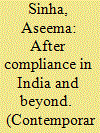

|
|
|
|
|
| Summary/Abstract |
Using India as a theory building case, this paper puts forward a theoretical framework for understanding countries’ responses to global rules and implementation effects across diverse global governance regimes and contexts. The initial premise for this paper is that the strategic structure of implementation dilemmas faced by states and actors within countries need to be understood in addition to design dilemmas. Successful global regimes must not only solve cooperation and uncertainty problems at the initial stages in choosing the right institutional matrix, but also ‘require changes in domestic institutions.’ The need to change domestic institutions creates certain implementation dilemmas. These dilemmas are a joint product of the institutional design, specific policy issue and the domestic logic of responses after international agreements have been signed. This broader idea helps understand a wide variety of India’s interactions across global governance institutions. I also suggest a novel empirical strategy of cross-institutional analysis to assess implementation dilemmas. While we have numerous cross-national studies of how compliance occurs in a wide variety of countries, we lack theory-driven, empirically grounded, comparative studies of a single country or a group of countries across diverse global regimes. Such a framework can help us better understand how countries interact with a variety of global institutions and the reciprocal effects. This framework is then used to understand India’s interactions with diverse global regimes in an illustrative manner in this article, and in greater detail by other authors in the section published in this issue of Contemporary South Asia.
|
|
|
|
|
|
|
|
|
|
|
|
|
|
|
|
| 3 |
ID:
168197
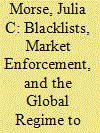

|
|
|
|
|
| Summary/Abstract |
This paper highlights how international organizations can use global performance indicators (GPIs) to drive policy change through transnational market pressure. When international organizations are credible assessors of state policy, and when monitored countries compete for market resources, GPIs transmit information about country risk and stabilize market expectations. Under these conditions banks and investors may restrict access to capital in noncompliant states and incentivize increased compliance. I demonstrate this market-enforcement mechanism by analyzing the Financial Action Task Force (FATF), an intergovernmental body that issues nonbinding recommendations to combat money laundering and the financing of terrorism. The FATF's public listing of noncompliant jurisdictions has prompted international banks to move resources away from listed states and raised the costs of continued noncompliance, significantly increasing the number of states with laws criminalizing terrorist financing. This finding suggests a powerful pathway through which institutions influence domestic policy and highlights the power of GPIs in an age where information is a global currency.
|
|
|
|
|
|
|
|
|
|
|
|
|
|
|
|
| 4 |
ID:
113471


|
|
|
|
|
| Publication |
2012.
|
| Summary/Abstract |
There is an international pragmatic shift towards the use of building energy regulations, standards and codes to reduce building energy consumption. The UK Government revised Building Regulations in 2002, 2006 and 2010, towards more stringent energy efficiency standards and ultimately the target of 'zero carbon' new homes from 2016. This paper aims to: reveal levels of compliance with energy Building Regulations of new-build dwellings in England and Wales; explore underlying issues; and identify possible solutions. In total 376 new-build dwellings were investigated. The compliance revealed was poor, at a level of 35%; accompanied by 43% 'grey compliance' and 21% 'grey non-compliance' (due to insufficient evidence of achieving required carbon emissions reductions). It is a serious concern when building control approves so many dwellings when insufficient evidence of compliance has been received. Underlying issues were centred on: incorrect compilation and/or insufficient submission of carbon emissions calculations by builders/developers; inappropriate timings of such submissions; and a paucity of proper checks by building control. Exploring these issues reveals a complex system of factors influencing energy regulations compliance, which involves a wide range of stakeholders. The findings should inform the formulation and implementation of energy efficiency building regulations and policy in the future.
|
|
|
|
|
|
|
|
|
|
|
|
|
|
|
|
| 5 |
ID:
156591
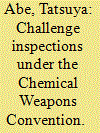

|
|
|
|
|
| Summary/Abstract |
The challenge-inspection system under the 1997 Chemical Weapons Convention has been regarded as an “epoch-making” procedure. Any state party can request a challenge inspection “anytime, anywhere, without right of refusal.” Yet, despite its high value in theory, no challenge inspection has yet been requested. There are legal, political, and other reasons that account for the absence of any such request. However, in the context of Syria's chemical weapons, several ad hoc measures have been taken that could be considered alternative to the challenge-inspection system. These developments have implications, largely negative, for that system. It is likely that ad hoc alternative measures will be employed in the future, though their use will depend on the situation. Although the challenge-inspection system may not be employed in the future, its theoretical availability remains and contributes to the prevention of noncompliance to a certain extent.
|
|
|
|
|
|
|
|
|
|
|
|
|
|
|
|
| 6 |
ID:
181170
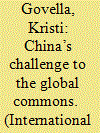

|
|
|
|
|
| Summary/Abstract |
It is often predicted that rising powers such as China will seek to reshape the international order as they gain influence. Drawing on comparative analysis of the maritime and cyber domains, this article argues that China poses a challenge to the global commons because its actions reflect a pragmatic focus on national interest that that disrupts more collaborative conceptions of their governance. However, instead of directly rejecting existing regimes, China has pursued a mixed strategy of complying when these regimes confer benefits and employing contestation or subversion when they conflict with its strategic aims. In particular, China has used contestation and subversion to push for the enclosure of the maritime and cyber domains, extending ideas of sovereignty and territoriality to them to varying extents. While the relatively well-institutionalized nature of maritime governance has limited China’s focus to the application of specific rules in areas where it prioritizes sovereign control, the embryonic status of the cyber regime has enabled China to call into question the fundamental definition of cyberspace as a global common. Subversion has also allowed China to accomplish strategic goals through ‘gray zone’ tactics, resulting in increased conflict below the level of war in both domains.
|
|
|
|
|
|
|
|
|
|
|
|
|
|
|
|
| 7 |
ID:
146887


|
|
|
|
|
| Summary/Abstract |
For more than two decades, under the imperative of ‘developing the country at all costs’, local governments in China have allowed developers and industrialists to set up polluting industries which have had deleterious effects on citizens’ health and the natural environment. However, China appears to have entered a new phase of determined and concerted efforts on the part of both the authorities and the public to tackle environmental problems. The articles in this special issue of China Information examine the main strengths and weaknesses of China’s current system of environmental governance. The central questions linking the case studies reported here are concerned with whether and how environmental policies formulated at the central level are implemented at the local level and how different agents and interests, making use of the available legislative means, influence this implementation process. Engaging a range of political, economic, social and cultural perspectives, the five contributions in this collection concentrate on two broad issues: resolution mechanisms for public participation in environmental governance and the actual enforcement of environmental regulations.
|
|
|
|
|
|
|
|
|
|
|
|
|
|
|
|
| 8 |
ID:
193208
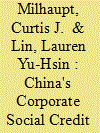

|
|
|
|
|
| Summary/Abstract |
Chinese state capitalism may be transitioning towards a technology-assisted variant that we call “surveillance state capitalism.” The mechanism driving this development is China's corporate social credit system (CSCS) – a data-driven project to evaluate the “trustworthiness” of all business entities in the country. In this paper, we provide the first empirical analysis of CSCS scores in Zhejiang province, as the Zhejiang provincial government is to date the only local government to publish the scores of locally registered firms. We find that while the CSCS is ostensibly a means of measuring legal compliance, politically connected firms receive higher scores. This result is driven by a “social responsibility” category in the scoring system that valorizes awards from the government and contributions to causes sanctioned by the Chinese Communist Party. Our analysis underscores the potential of the CSCS to nudge corporate fealty to party-state policy and provides an early window into the far-reaching potential implications of the CSCS.
|
|
|
|
|
|
|
|
|
|
|
|
|
|
|
|
| 9 |
ID:
085329


|
|
|
|
|
| Publication |
2008.
|
| Summary/Abstract |
Many case studies and some large-N research have shown that upstream-downstream cooperation in international river basins occurs quite frequently. The same holds for global water governance efforts more generally. Yet such findings are blind in one eye because they focus primarily on political commitments or compliance with international agreements. A policy performance metric (PER) allows for a more substantive assessment of success or failure in international water governance. To test its usefulness, this article applies this metric to the Naryn/Syr Darya basin, a major international river system in Central Asia. Management of the Toktogul reservoir, the main reservoir in the Naryn/Syr Darya basin, was internationalized in 1991 when the Soviet Union collapsed. Compliance with an international agreement, concluded in 1998, has been quite high. This agreement establishes an international trade-off between water releases for upstream hydropower production in winter and water releases for downstream irrigation in summer. However, performance of this agreement over time has been very low and highly variable. The management system in place is therefore in urgent need of reform. Studies of international and global water governance should pay more attention to the degree to which political commitments actually further de facto problem solving.
|
|
|
|
|
|
|
|
|
|
|
|
|
|
|
|
| 10 |
ID:
131370
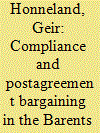

|
|
|
|
|
| Publication |
2014.
|
| Summary/Abstract |
States' failure to comply with their international obligations has been viewed by institutional theory as problems to be solved, rather than as wrongs to be punished. This article reviews how Norway has employed different postagreement bargaining strategies in the Joint Norwegian-Russian Fisheries Commission in order to enhance Russian compliance with the bilateral fisheries agreements in the Barents Sea and with the precautionary approach more widely.
|
|
|
|
|
|
|
|
|
|
|
|
|
|
|
|
| 11 |
ID:
187496


|
|
|
|
|
| Summary/Abstract |
Arms control has increasingly become threatened by compliance issues. Viewed individually, these issues might be expected and should not be cause for alarm. However, the list of agreements with unresolved issues has grown too long to ignore. The US State Department’s 2021 arms-control-compliance report calls attention to this problem. Recent casualties include the 1987 Intermediate-Range Nuclear Forces Treaty, the 1990 Conventional Armed Forces in Europe Treaty, and the 1992 Open Skies Treaty. Although the 2010 New Strategic Arms Reduction Treaty has been renewed, even the 1968 Treaty on the Non-Proliferation of Nuclear Weapons is under stress because of the view, shared by many states, that there has been a failure to implement its key nuclear-disarmament obligation. Many are advocating a move to less formal arms-control arrangements that are politically but not legally binding. However, these bring their own set of compliance problems—in particular, lack of effective verification regimes and dispute-resolution mechanisms. The current approach to compliance issues is failing. These issues need more urgent, high-level attention if the world is to avoid this threat to international peace and security.
|
|
|
|
|
|
|
|
|
|
|
|
|
|
|
|
| 12 |
ID:
182966


|
|
|
|
|
| Summary/Abstract |
The 1993 Chemical Weapons Convention (CWC) and the 1972 Biological and Toxin Weapons Convention (BWC) are key components of the international arms-control landscape. Yet the two conventions differ widely, particularly in the ways that are available to treaty parties to resolve any questions about compliance with the treaties. Both contain language concerning consultation and cooperation, but the CWC also has extensive procedures available to investigate allegations of noncompliance. This article reviews these differences in the conventions and explains, in part, how and why they came about. The Organisation for the Prohibition of Chemical Weapons (OPCW) has engaged in several consultations regarding compliance issues, but the OPCW publishes virtually nothing about the topics of the consultations or their frequency, findings, or conclusions. An exception, perhaps, is the OPCW’s work regarding Syrian use of chemical weapons (CW). Moreover, thus far, no treaty party has called for a challenge inspection to officially investigate perhaps the most serious allegations of treaty violations: Syrian and Russian alleged use of CW. The BWC states parties conducted one formal consultation raised by Cuba, alleging that the United States dropped biological agents on the island nation from airplanes to cause an animal epidemic. The consultation reached no official conclusion. The article goes on to praise the work of Raymond Zilinskas debunking the allegations through a careful scientific review of the Cuban claims. The article discusses the consequences of secrecy surrounding the CWC consultation process and laments that the BWC does not have the institutional capacity to carry on the type of analysis that Zilinskas undertook discrediting the Cuban allegations.
|
|
|
|
|
|
|
|
|
|
|
|
|
|
|
|
| 13 |
ID:
152057
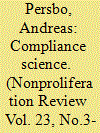

|
|
|
|
|
| Summary/Abstract |
The Comprehensive Nuclear-Test-Ban Treaty's verification regime is arguably one of the most effective and efficient systems of arms-control and disarmament monitoring in operation today. The science and technology underpinning the system have been developed over several decades. This article goes through the treaty's international monitoring system and pays particular attention to its waveform-monitoring techniques. It then considers the concept of data fusion, before describing the agreement's on-site-inspection mechanism. It briefly discusses how alleged noncompliance is likely to be resolved. It concludes by arguing that the treaty's verification regime is expected to make cheating costly, which enhances the treaty's deterrent effect.
|
|
|
|
|
|
|
|
|
|
|
|
|
|
|
|
| 14 |
ID:
071599


|
|
|
|
|
| Publication |
2006.
|
| Summary/Abstract |
Are certain countries more likely to comply with international law than others? History has provided an interesting test of several competing theories of international rule compliance in the form of the UN Security Council's Resolution 1373 to combat international terrorism. We apply a mix of quantitative and qualitative methods to test the salience of various national characteristics - domestic political culture, national interests, regionalism, dependency, power, international alliance patterns, past patterns of compliance. In the end, while all the factors seem to have a bearing on the outcome, regionalism and past patterns of compliance emerge as particularly significant.
|
|
|
|
|
|
|
|
|
|
|
|
|
|
|
|
| 15 |
ID:
178727


|
|
|
|
|
| Summary/Abstract |
While a dominant position in research on compliance holds that enforcement is necessary for states to abide by their international commitments, many international organizations (IOs) do not have recourse to such coercive means. This article offers the first systematic analysis of one prominent alternative to material coercion: compliance reporting by IOs. It develops an argument for why reporting by IOs should lead states to correct non-compliant behavior, and when those effects should be particularly strong. It tests this argument in the context of the International Labour Organization (ILO), which offers a unique setting for evaluating the impact of reporting in the absence of coercion. The principal findings are threefold. First, reporting has significant and durable effects on state respect for labor rights. Second, reporting affects compliance both immediately and when repeated over longer periods of time. Third, reporting has stronger effects on improvements in labor rights when target states are democratic and resourceful, and have a stronger presence of labor NGOs. By contrast, it does not matter to reporting’s effect whether states are highly economically dependent on the outside world or whether reporting is coupled with active shaming of non-compliant states. Taken together, our results suggest that existing research has not fully appreciated the potential of monitoring systems based on reporting to generate compliance with international rules. While hard enforcement may still be important, especially in areas where incentives to renege are strong, the findings of this article suggest that it is not the exclusive path to compliance.
|
|
|
|
|
|
|
|
|
|
|
|
|
|
|
|
| 16 |
ID:
106357


|
|
|
|
|
| Publication |
2011.
|
| Summary/Abstract |
The adoption of UN Security Council Resolution (UNSCR) 1540 in 2004 reflects an emerging consensus that more should be done by the international community to address the proliferation of weapons of mass destruction. UNSCR 1540 articulates a universal, legally binding obligation for all states to confront proliferation by adopting effective export control systems. To date, however, there have been no attempts to systematically analyze compliance with this new obligation, making it impossible to assess the success of this measure and the underlying causes of any shortcomings. This study addresses this by conducting a systematic empirical analysis of state compliance with UNSCR 1540. Drawing upon theories of compliance with international law, we investigate two distinct explanations for variation in the degree to which states adopt nonproliferation export controls: one based on state interests and enforcement and the other based on state capacity. Our statistical tests of these theories use a new, cross-national data set detailing the nonproliferation policies of 30 states. The empirical results indicate that compliance with international nonproliferation obligations is influenced most by a state's economic and governmental capacities and has little to do with interest-based factors. These findings suggest that capacity-building programs are the best option for improving the implementation of UNSCR 1540 and of nonproliferation efforts in general.
|
|
|
|
|
|
|
|
|
|
|
|
|
|
|
|
| 17 |
ID:
073762
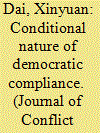

|
|
|
|
|
| Publication |
2006.
|
| Summary/Abstract |
Do democratic institutions enhance a country's compliance with international commitments? The author develops a game-theoretic model that highlights the conditional nature of democratic institutions' effect on compliance. Rather than assuming that the electorate in a democracy benefits from compliance uniformly, the author considers domestic distributional consequences of compliance. The model thus incorporates the preferences of competing domestic constituents as well as their politically relevant attributes such as electoral leverage and informational advantage. The model shows that, although electoral institutions intensify politicians' accountability to domestic constituents, the direction of this electoral effect on compliance is determined by the political attributes of competing interests. The author illustrates this theory with examples of international economic and environmental policies.
|
|
|
|
|
|
|
|
|
|
|
|
|
|
|
|
| 18 |
ID:
106058


|
|
|
|
|
| Publication |
2011.
|
| Summary/Abstract |
Established conflict theories focus on the role of incentives in the decision to join, stay, or leave an insurgency. These theories, however, disregard the pressure that an organization can impose on its members. Similar to legal organizations, we assert that a rebel organization can sustain itself by effective human resource management. Using narratives resulting from psychological trauma therapy of former combatants of the Lord's Resistance Army (LRA), these management strategies are examined. The analysis shows that the LRA sustains itself in the first place by the use of brute force. However, they also manage themselves by a careful selection process of their fighters, by the conscious creation of social control, and by offering their members an alternative social network in which promotion and compensation play a role.
|
|
|
|
|
|
|
|
|
|
|
|
|
|
|
|
| 19 |
ID:
152059


|
|
|
|
|
| Summary/Abstract |
Twenty years after the establishment of the Preparatory Commission charged with setting up the Comprehensive Nuclear-Test-Ban Treaty Organization, the CTBT is still not in force. Nevertheless, based on the legal instruments adopted in 1996 by the state signatories, the commission has standing as a full-fledged international organization with the legal capacity needed for the exercise of its functions and the fulfillment of its purposes. Moreover, the verification technologies developed by the organization have triggered manifold effects, particularly for disaster warning and response. Irrespective of CTBT entry into force, the commission is playing a relevant role in monitoring nuclear testing as well as in delivering the benefits of verification technologies to the international community.
|
|
|
|
|
|
|
|
|
|
|
|
|
|
|
|
| 20 |
ID:
169456


|
|
|
|
|
| Summary/Abstract |
Researchers have recently proposed a new approach to nuclear-arms-control verification, dubbed “deferred verification.” The concept forgoes inspections at sensitive nuclear sites and of nuclear weapons or components in classified form. To implement this concept, a state first divides its nuclear program into a closed segment and an open segment. The total fissile-material inventory in the closed segment, which includes the weapon complex, is known and declared with very high accuracy. Essentially no inspections take place in the closed segment. In contrast, inspectors have access to the open segment, which includes in particular the civilian nuclear sector. The fissile-material inventory in the open segment is known with less accuracy, but uncertainties can be reduced over time using nuclear-archaeology methods. Deferred verification relies primarily on established safeguards techniques and avoids many unresolved verification challenges, such as the need for information barriers for warhead confirmation measurements. At the same time, deferred verification faces some unique challenges. Here, we explore some of these challenges and offer possible solutions; to do so, we examine possible noncompliance strategies in which a state would seek to withhold a higher-than-declared inventory.
|
|
|
|
|
|
|
|
|
|
|
|
|
|
|
|
|
|
|
|
|